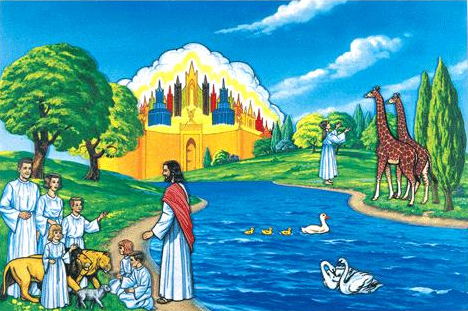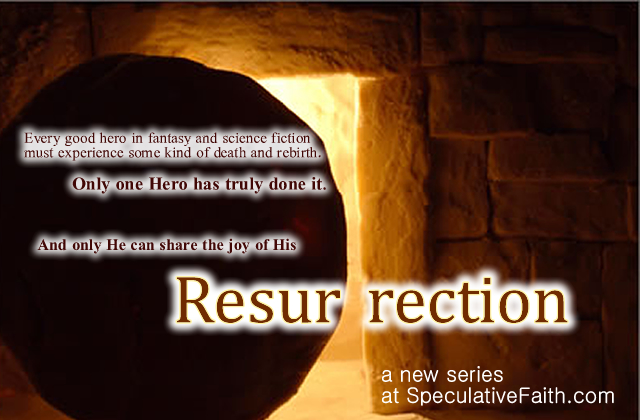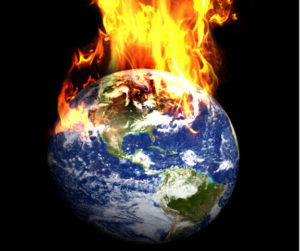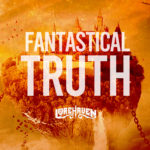Resurrection, Part 4: Creation Will Rise
Why do Christians exploring God’s true Story often stop just before its grandest finale?
After suffering God’s wrath and death as a substitute for sinners, Jesus bodily resurrected Himself. Last Easter we celebrated that truth again.
Glorious. His resurrection proves He conquered death! What happens next?
Jesus left Earth, but also left the divine Holy Spirit. He began work that continues today: resurrecting saints from spiritual death to serve Him in His Kingdom colony, the Church.
Fantastic. Jesus shares His resurrection power with His people. What happens next?
Christ will return, and according to the Left Behind series, only after a lengthy end-times scenario featuring evil dictators, special effects, and Satanic mind control.
Hmm. Interesting. I should read the news and panic more often. What happens next?
Having finished His resurrection work, Jesus nukes Earth and takes His people to Heaven.
Oh-kay. What happens next?
It will be wonderful. But we can’t know. “No eye has seen” (1 Cor. 2:9), that’s all we know.
THE END(?)
The third Resurrection
No. That’s not the very end of God’s Story. And knowing more (still not all, of course) about His Story’s true ending has changed my life. It may also change why and how we enjoy any other fantastic stories.
1 Corinthians 15:23 summarizes the first two resurrections. Jesus Christ is risen. In Him, His people are also risen, and will rise. “Then comes the end, when he delivers the kingdom to God the Father after destroying every rule and every authority and power,” Paul writes (1 Cor. 15:24). Elsewhere the apostle goes into greater detail about this third resurrection:
For the creation waits with eager longing for the revealing of the sons of God. The creation was subjected to futility, not willingly, but because of him who subjected it, in hope that the creation itself will be set free from its bondage to corruption and obtain the freedom of the glory of the children of God. For we know that the whole creation has been groaning together in the pains of childbirth until now. And not only the creation, but we ourselves, who have the firstfruits of the Spirit, groan inwardly as we wait eagerly for adoption as sons, the redemption of our bodies.
Romans 8: 20-23
Creation doesn’t “want” to suffer. God — not man, not the Devil — subjected it to suffering. And God doesn’t intend to punish creation for its caretakers’ rebellion.1 Instead He will resurrect “the creation itself,” just as He will physically resurrect His people.
He will turn the groaning, ours and creation’s, into singing.
 David and other Old-Testament prophets anticipated a time when creation would perfectly sing God’s praises, with Jerusalem at the Kingdom’s center (the Psalms).
David and other Old-Testament prophets anticipated a time when creation would perfectly sing God’s praises, with Jerusalem at the Kingdom’s center (the Psalms).
Isaiah prophesied a New Heavens and New Earth (Isaiah 60, 65-66).
The Apostle John echoed that promise (Rev. 21). “Now the dwelling of God is with man,” on New Earth (Rev. 21:3). As one of my church’s teachers said last Sunday, God does not take His people away to live in His home. He redeems our home, and then moves there Himself.
Jesus Who died shall be satisfied / And Earth and Heaven be one.
Jesus resurrected Himself, resurrects people spiritually and then physically, then finally will resurrect creation itself. That means we can look at this wondrous creation, groan over sin’s infection, yet begin to imagine what this universe would be like when it’s redeemed. Will we enjoy science? Space exploration? Wondrous music? Deep-sea diving? Enhanced athletic competition? The most incredible feasts imaginable? In the New Heavens and New Earth, will nearly every wonder we think limited to literary-fantasy worlds become reality?
World changes
This truth shatters more than dimly lit views of eternity. It also means we must reevaluate phrases like “this world is not our home” or “we’ll never see beloved relatives again on this Earth,” or “only two things in this world will last: God and human souls.” It also transforms how we see fantastic stories, material wealth, time, vocation, church and state, everything.
And this challenges common views of passages such as in 1 Cor. 2 and 15, and in 2 Peter 3.
“Natural body.” Doesn’t the Bible say we will have “a spiritual body,” not “a natural body” (1 Cor. 15:44) and that “flesh and blood cannot inherit the kingdom of God” (1 Cor. 15:50)?
Absolutely it does. And we need those truths, lest we assume (as some who overemphasize physical things do) that we can skip as-is into God’s physical Kingdom without some great change in our persons. Yet we shouldn’t assume spiritual means bodiless. If that were true, God would not encourage us to be spiritual even in our current bodies (1 Cor. 2: 14-15). Natural and flesh and blood mean fallen. “Spiritual” means Spirit-influenced.
“No eye has seen.” What about 1 Cor. 2:9? Doesn’t this discourage dreaming of New Earth?
It might discourage this, if Paul were offering a caution that’s even about the afterlife. But in the NIV “no eye has seen” is only part of Paul’s thought, which in context is about “God’s wisdom, a mystery that has been hidden” — hidden, that is, until now.
However, as it is written:
“What no eye has seen,
what no ear has heard,
and what no human mind has conceived”—
the things God has prepared for those who love him—these are the things God has revealed to us by his Spirit.
(1 Cor. 2: 9-10, NIV)
God still has His secrets (Deut. 29:29). But He has revealed more about Himself and about what His resurrected creation will be like than we may think. Once He does reveal a secret, it belongs to His people and their children forever (the rest of Deut. 29:29).
“Burned up.” Won’t the Earth be “burned up,” nuked away, according to 2 Peter 3:10 (KJV)?
Sounds like it — at first glance. We need to know this truth: many things will be burned. If we live for money, our money will burn. If we live for family love, that love will go up in smoke. If we live for political/social change, that false religion will explode. And if we live only for new thrills from the next great manmade story, those stories will be destroyed.
Live for anything but Christ, and we ourselves will burn. Forever. 2
But Peter is clear that it’s the “heavenly bodies [that] will be burned up and dissolved” and “the earth and the works that are done on it will be exposed” (2 Peter 3:10, ESV). Evidently only newer (less-reliable) manuscripts render the refiner’s-fire-sounding term “exposed” as “burned up” (as in the KJV). It’s still sobering: Earth and all our works on the face of it will face God’s judgment. But it’s not a total annihilation of the planet.3
What about materialism? Doesn’t this view only encourage us to cling to temporary things?
I don’t know about others. I can only say for sure that believing and exploring this doctrine of a third resurrection for “the creation itself” has helped make me less materialistic. Since beginning this study, I’ve also longed more than ever before for Christ’s return, His victory, His Kingdom, and living in that light as His adopted son and as part of His Church.
If it weren’t for this truth, I would be doing my best to mortify, not explore, my love for fantastic stories.
If no story has any chance of being used for God’s Kingdom, both now and for eternity, then I say let them burn now before they burn at His judgment.
Yet I don’t believe all stories will burn. We can worship God while enjoying stories, now and forever.
Series conclusion
Jesus died for His people’s sins and resurrected from the dead. That’s the simple truth.
It’s all you need to believe to be a Christian.
However, God’s Story also encourages us with much more.
Resurrection spreads to His people now.
It will spread to His creation, Earth and beyond, in the future.
And that’s the most fantastic world we can anticipate long after Easter is past.
- If anything, God uses creation’s groaning to reinforce sin’s consequences. ↩
- Even if we somehow entered Heaven, it would be for us Hell. I often want to ask non-Christians, who expect a default Heavenly destiny after death, what exactly would be fun about such an existence. ↩
- The ESV Study Bible notes: “Some translations read ‘will be burned up’ (Gk. katakaēsetai) because some Greek manuscripts have this wording (instead of Gk. heurethēsetai). But the earliest and most reliable manuscripts have ‘will be found’ (Gk. heurethēsetai), indicating with this reading that the annihilation of the earth is not taught in this passage.” ↩










































An interesting thought. The concept that God would ultimately redeem and restore the Earth itself was part of the old revelation. It was already revealed and believed when God revealed Himself much more directly through Christ. It seems strange, then, that some people who believed in the visible example of Christ’s resurrection failed to see it as a confirmation of the promise to eventually renew all of creation. I should dig into the historical beliefs of Christianity and Judaism regarding the ultimate fate of Earth. I’m guessing that the mainstream of Judeo-Christian tradition has always taken for granted that Earth would be renewed and established forever. Many of the old Protestant hymns would reinforce this idea.